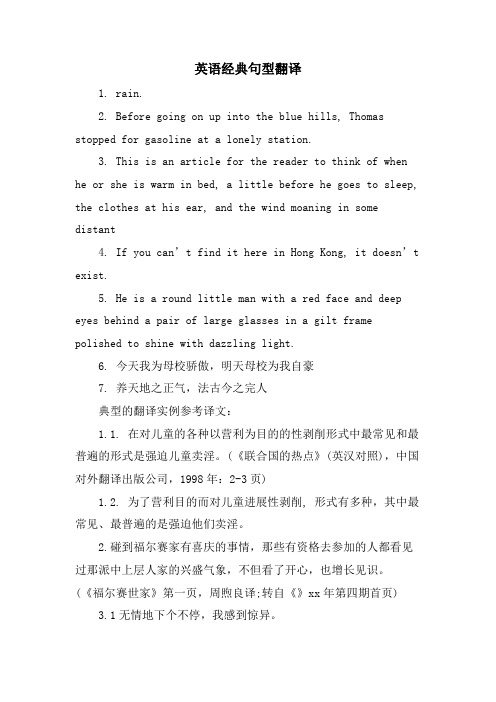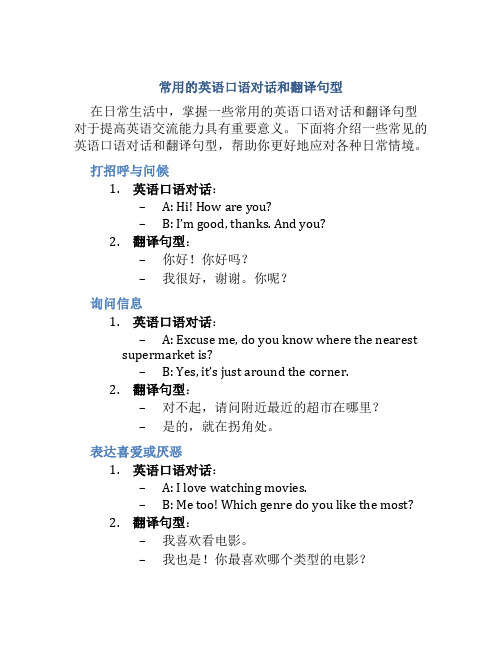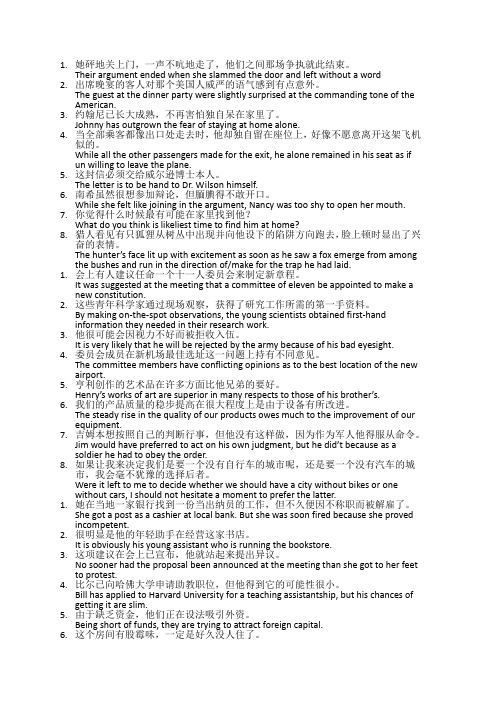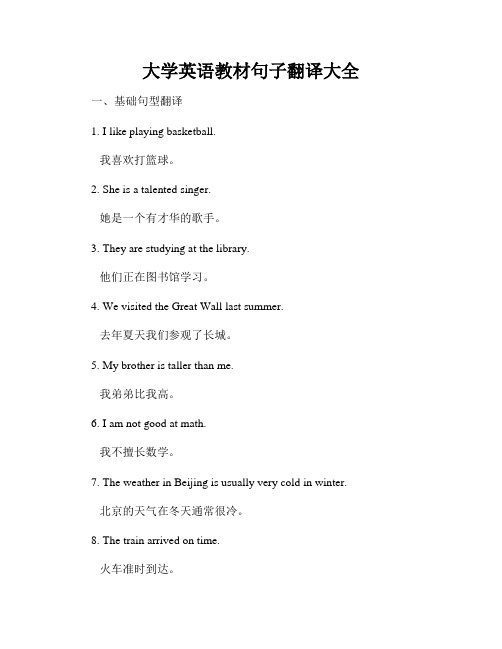英语常用句型翻译
英语句型翻译

英语经典句型翻译1. rain.2. Before going on up into the blue hills, Thomas stopped for gasoline at a lonely station.3. This is an article for the reader to think of when he or she is warm in bed, a little before he goes to sleep, the clothes at his ear, and the wind moaning in somedistant4. If you can’t find it here in Hong Kong, it doesn’t exist.5. He is a round little man with a red face and deep eyes behind a pair of large glasses in a gilt frame polished to shine with dazzling light.6. 今天我为母校骄傲,明天母校为我自豪7. 养天地之正气,法古今之完人典型的翻译实例参考译文:1.1. 在对儿童的各种以营利为目的的性剥削形式中最常见和最普遍的形式是强迫儿童卖淫。
(《联合国的热点》(英汉对照),中国对外翻译出版公司,1998年:2-3页)1.2. 为了营利目的而对儿童进展性剥削, 形式有多种,其中最常见、最普遍的是强迫他们卖淫。
2.碰到福尔赛家有喜庆的事情,那些有资格去参加的人都看见过那派中上层人家的兴盛气象,不但看了开心,也增长见识。
(《福尔赛世家》第一页,周煦良译;转自《》xx年第四期首页)3.1无情地下个不停,我感到惊异。
3.2 我感到惊异,雨竟这样无情地下个不停。
4.1 在继续往前上坡进入那苍翠的群山之前, 托马斯停在一个孤零零的加油站加油。
60句英语口语常用句型带翻译

60句英语口语常用句型带翻译"What do you think?" - 你认为呢?"I'll take care of it." - 我会处理好的。
"I'm looking forward to it." - 我期待着。
"I'm on my way." - 我在路上。
"I'll get back to you." - 我会回复你的。
"I'm not ready yet." - 我还没准备好。
"I'm in a hurry." - 我在匆忙。
"I'm starving." - 我饿极了。
"I'm exhausted." - 我累极了。
"I'm proud of you." - 我为你感到骄傲。
"I'm in trouble." - 我有麻烦了。
"I'm not feeling well." - 我身体不舒服。
"I'm sorry to hear that." - 很遗憾听到这个。
"I'm glad to hear that." - 很高兴听到这个。
"I'm not interested." - 我不感兴趣。
"I'm curious." - 我很好奇。
"I'm surprised." - 我很惊讶。
"I'm nervous." - 我有点紧张。
"I'm happy." - 我很高兴。
高考英语经典句型翻译

一、~~~ the + ~ est + 名词+ (that) + 主语+ have ever + seen ( known / heard / had / read, etc)~~~ the most + 形容词+ 名词+ (that) + 主语+ have ever + seen ( known / heard / had / read, etc)例句:海伦是我所见过的最美丽的女孩。
Helen is the most beautiful girl that I have ever seen.张老师是我曾经遇到的最仁慈的教师。
那是我们曾经住过的最昂贵的旅馆。
那是我所看过的最有趣的电影。
“茶馆”是我们所看过的最好的戏剧。
悉尼是我所参观过的最美的城市。
Mr. Zhang is the kindest teacher that I have ever had.That is the most expensive hotel that we have ever stayed in.That is the most interesting film that I have ever seen.Tea House is the best play that we have ever seen.Sydney is the most beautiful city that I’ve ever visited.二、Nothing is + ~~~ er than to + V.Nothing is + more + 形容词+ than to + V.例句:没有比接受教育更重要的事了。
Nothing is more important than to receive education.没有比上大学更令人激动的事了。
没有比学习数学更困难的事了。
没有比在河里游泳更有趣的事了。
没有比执行这项政策更紧急的事了。
工作一整天之后,没有比休息更有必要的事了。
英语翻译常用句型(加精)

英语翻译常考句型详解1.It is not that…but that… 这不是说…,而是说…「例文」It is not that the scales in the one case, and the balance in the other, differ in the principles of their construction or manner of working; but that the latter is much finer apparatus and of couse much more accurate in its measurement than the former.「译文」这并不是说在一种情况下所使用的磅秤和在另一种情况下所使用的天平在构造原理上或工作方式上存在差别,而是说与前者相比,后者是一种更精密得多的装置,因而在计量上必然更加准确。
2.nothing else than 完全是,实在是「例文」What the man said was nothing else than nonsense.「译文」那个人讲的话完全是一派胡言。
3.as引导的特殊状语从句,翻译时做定语从句处理。
「例文」We hope the measures to control prices, as they have been taken by the government, will succeed.「译文」我们希望,政府已经采取的控制物价的措施将取得成功。
4.名词+or+名词结构中,or后的名词是同位语,应译为即…;或者称….「例文」Moreover, technology includes techniques , or ways to do things , as well as the manchines that may or may not be necessary to apply them.「译文」再者,除机器外技术还包括技艺,即制作方法,而运用这些记忆并不一定都需要机器。
英文翻译

1.Potluck Party:一种聚餐方式,主人准备场地和餐具,参加的人必须带一道菜或准备饮料,最好事先问问主人的意思。
2.Pull over!把车子开到旁边。
3.Drop me a line!写封信给我。
Give me a ring. = Call me!来个电话吧!4.For here or to go?堂食或外卖。
5.Cool:That's cool! 等於台湾年轻人常用的囗语"酷!",表示不赖嘛!用于人或事均可6.What's up? = What's happening? = What's new? 见面时随囗问候的话"最近在忙什么?有什么新鲜事吗?"一般的回答是"Nothing much!"或"Nothing new!"7.Cut it out! = Knock it out!= Stop it! 少来这一套!同学之间开玩笑的话。
8.Don't give me a hard time! 别跟我过不去好不好!9.Get yourself together! 振作点行不行!10.Do you have "the" time? 现在几点钟?可别误以为人家要约你出去。
11.Hang in there. = Don't give up. = Keep trying. 再撑一下。
12.Give me a break! 你饶了我吧!(开玩笑的话)13.Hang on. 请稍候。
14.Blow it. = Screw up. 搞砸了。
15.What a big hassle. 真是个麻烦事。
16.What a crummy day. 多倒霉的一天。
17.Go for it. 加油18.You bet. = Of course. 当然;看我的!19.Wishful thinking. 一厢情愿的想法。
常用的英语口语对话和翻译句型

常用的英语口语对话和翻译句型在日常生活中,掌握一些常用的英语口语对话和翻译句型对于提高英语交流能力具有重要意义。
下面将介绍一些常见的英语口语对话和翻译句型,帮助你更好地应对各种日常情境。
打招呼与问候1.英语口语对话:–A: Hi! How are you?–B: I’m good, thanks. And you?2.翻译句型:–你好!你好吗?–我很好,谢谢。
你呢?询问信息1.英语口语对话:–A: Excuse me, do you know where the nearest supermarket is?–B: Yes, it’s just around the corner.2.翻译句型:–对不起,请问附近最近的超市在哪里?–是的,就在拐角处。
表达喜爱或厌恶1.英语口语对话:–A: I love watching movies.–B: Me too! Which genre do you like the most?2.翻译句型:–我喜欢看电影。
–我也是!你最喜欢哪个类型的电影?道歉与原谅1.英语口语对话:–A: I’m sorry for being late.–B: That’s okay. Don’t worry about it.2.翻译句型:–对不起,我迟到了。
–没关系,别担心。
谈论天气1.英语口语对话:–A: It’s such a nice day today, isn’t it?–B: Yes, the weather is perfect for a picnic.2.翻译句型:–今天天气真好,不是吗?–是的,天气正适合野餐。
咨询建议1.英语口语对话:–A: Can you give me some advice on how to improve my English?–B: Sure, practice speaking English every day.2.翻译句型:–你能给我一些建议,如何提高我的英语吗?–当然,每天练习说英语。
英语句型翻译

1.她砰地关上门,一声不吭地走了,他们之间那场争执就此结束。
Their argument ended when she slammed the door and left without a word2.出席晚宴的客人对那个美国人威严的语气感到有点意外。
The guest at the dinner party were slightly surprised at the commanding tone of the American.3.约翰尼已长大成熟,不再害怕独自呆在家里了。
Johnny has outgrown the fear of staying at home alone.4.当全部乘客都像出口处走去时,他却独自留在座位上,好像不愿意离开这架飞机似的。
While all the other passengers made for the exit, he alone remained in his seat as if un willing to leave the plane.5.这封信必须交给威尔逊博士本人。
The letter is to be hand to Dr. Wilson himself.6.南希虽然很想参加辩论,但腼腆得不敢开口。
While she felt like joining in the argument, Nancy was too shy to open her mouth.7.你觉得什么时候最有可能在家里找到他?What do you think is likeliest time to find him at home?8.猎人看见有只狐狸从树丛中出现并向他设下的陷阱方向跑去,脸上顿时显出了兴奋的表情。
The hunter’s face lit up wit h excitement as soon as he saw a fox emerge from among the bushes and run in the direction of/make for the trap he had laid.1.会上有人建议任命一个十一人委员会来制定新章程。
大学英语教材句子翻译大全

大学英语教材句子翻译大全一、基础句型翻译1. I like playing basketball.我喜欢打篮球。
2. She is a talented singer.她是一个有才华的歌手。
3. They are studying at the library.他们正在图书馆学习。
4. We visited the Great Wall last summer.去年夏天我们参观了长城。
5. My brother is taller than me.我弟弟比我高。
6. I am not good at math.我不擅长数学。
7. The weather in Beijing is usually very cold in winter.北京的天气在冬天通常很冷。
8. The train arrived on time.火车准时到达。
9. She has a beautiful voice.她有一副美妙的嗓音。
10. We had a wonderful time at the party last night.昨晚在派对上我们度过了美好的时光。
二、日常对话翻译1. A: Good morning! How are you today?早上好!你今天好吗?B: I'm good, thank you. How about you?我很好,谢谢你。
你呢?2. A: Excuse me, where is the nearest post office?打扰一下,最近的邮局在哪里?B: Go straight ahead and turn left at the corner. It's just across the street.直走然后在拐角处左转,就在街对面。
3. A: What time is the movie?电影几点开始?B: The movie starts at 7:30 p.m.电影晚上7点半开始。
- 1、下载文档前请自行甄别文档内容的完整性,平台不提供额外的编辑、内容补充、找答案等附加服务。
- 2、"仅部分预览"的文档,不可在线预览部分如存在完整性等问题,可反馈申请退款(可完整预览的文档不适用该条件!)。
- 3、如文档侵犯您的权益,请联系客服反馈,我们会尽快为您处理(人工客服工作时间:9:00-18:30)。
e. 语气副词置于句首的句子
1. No defects did we find in these parts.
在这些零件里,我们没发现什么瑕疵。 2. Scarcely did they speak about the
difficulties in their work. 他们很少谈到自己工作中的困难。
光的运行速度如此之快, 我们都很难 想象。
Tel:400 116 5880
b. 地点副词移到句首的句子
1. Here come the bus! 2. There goes the bell. 3. Down came the hammer and
out flow the sparks. 铁锤一落, 火星四射。
c. 强调状语
1. It was not until evening that we learned the unhappy news.
直到晚上,我们才得知这不幸的消息。 2. It was here that he told me
what had happened two years ago. 就是在这里他向我讲述了两年前发生 的事情。
Tel:400 116 5880
(1)用do来强调的语句
可把 do 译为 “确实”、“一定”、 “必须” 等词, 以加强语气。
Examples: 1. These bacteria are too small
to be seen, but they do exist. 这些细菌小得看不见, 但它们确实存
Tel:400 116 5880
(3)利用倒装结构表示强调
英语句子的倒装结构主要出于上下文或预期 上的需要,以使说话或文章中心突出有力。 谚语一般不用倒装结构, 所以英译汉时常需 作适当的改变。用倒装语序构成的强调句在 翻译时要根据情况作不同的处理。但不是所 有的倒装语序都一定要译成强调句。
翻译这类强调句时,一般采用顺译法即可表 到强调意味, 有时也用语气词“就”、“也” 等字来表示强调。
他首先是与约翰取得联系的。 2. It was a bouquet of roses that
was left to us. 留给我们的是一束玫瑰。 3. It is this molecular motion that
we call heat. 正是这种分子运动我们称之为热。
Tel:400 5880
浅薄之人,以貌取人。
2. It is not helps but obstacles that makes a man.
使人成才的, 不是助力而是阻力。 (或)造就一个人, 不是扶助他,而
是磨难他。
Tel:400 116 5880
b. 强调宾语
1. It was John with whom he first came into contact.
Tel:400 116 5880
c. 程度副词置于句首的句子
1. Only after they had performed hundreds of experiments did they succeed in solving the problem.
只有在做了几百次实验之后, 他们才 把这一问题解决了。
Tel:400 116 5880
此外, 在比较状语从句或方式状语从 句采用倒装语序的强调句中,译成汉语 时和原文使用的自然语序相同。
如:
The melting point of copper is not so high as (is) that of iron.
在。
Tel:400 116 5880
2. This reaction did take place. 这种反应确实发生了。
3. They do represent extreme cases.
它们确实代表特殊情况。
Tel:400 116 5880
(2)It (was)…that(which,who) 强调的句型
2. Hence comes the name magnet. 由此得出磁铁这个名称。
Tel:400 116 5880
d. 时间副词置于句首的句子
1. Now comes your turn. 现在轮到你了。 2. Then began our new lesson. 于是我们开始上新课。
用强调句型 “It is(was)…that(which,who)…”
可以强调主语、宾语、状语。对于强调 句, 在译文里可用“正是”一类的字 眼来强调有关成分。整个句子应当顺译, 但在强调宾语时也可以倒译。
Tel:400 116 5880
a. 强调主语
1. It is shallow people who judge by appearances.
常用句式的翻译方法
--译国译民翻译公司
Tel:400 116 5880
常用句式的翻译方法 1、强调句 2、否定句 3、虚拟语气 4、成语习语 5、其它动词形式
Tel:400 116 5880
1、强调句的译法 英语的句子可利用不同的语法手法
来强调其中的某个成分, 从而构成 了强调句。强调的方法有三种。
Tel:400 116 5880
a. 状语在句首, 包括某些状语从句。
1. Much as he likes physics, he likes mathematics better.
虽然他很喜欢物理, 但更喜欢数学。
2. So fast does light travel that it is difficult for us to imagine its speed.
Tel:400 116 5880
3. It is from radio that the subject of electronics was born, which brought such great changes to the technology of today.
电子这门学科正是从无线电产生的, 它为现代技术带来了如此巨大的变化。
